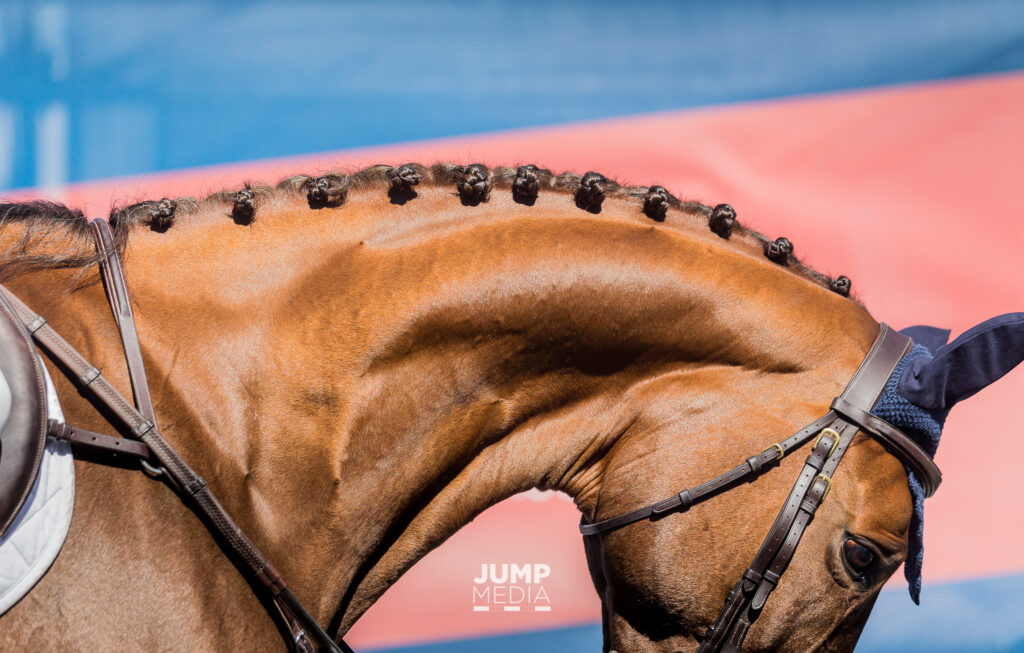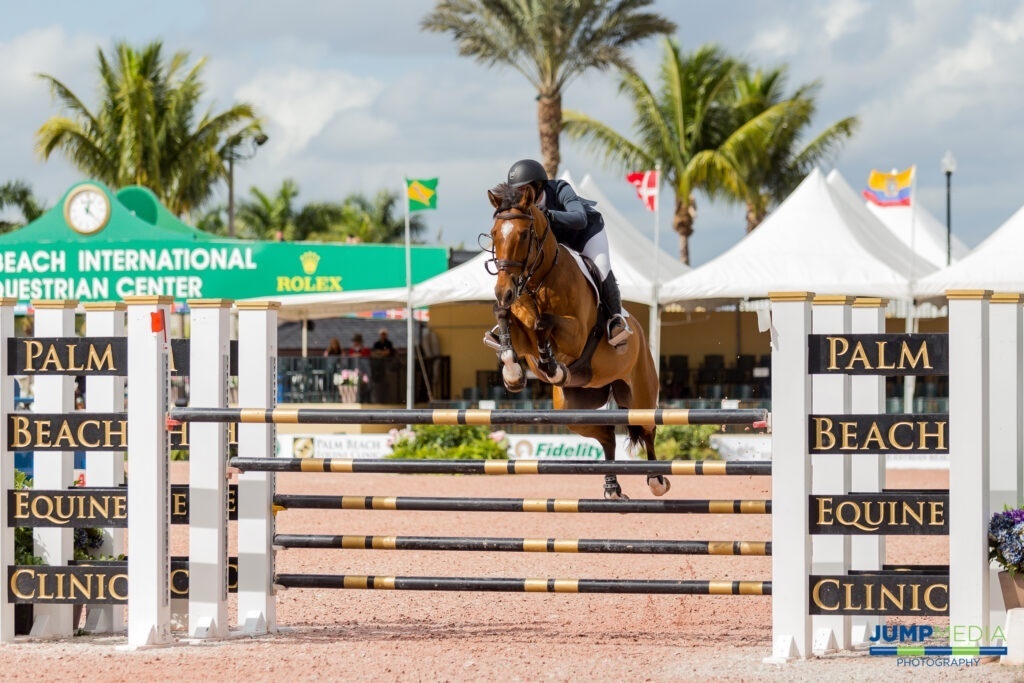Tag: wheeler
Palm Beach Equine Clinic veterinarian Dr. Richard Wheeler breaks down joint injections in this recent Noelle Floyd Equestrian Masterclass.
Demystify Joint Injections with Dr. Wheeler
In this Equestrian Masterclass by Noelle Floyd, you will learn:
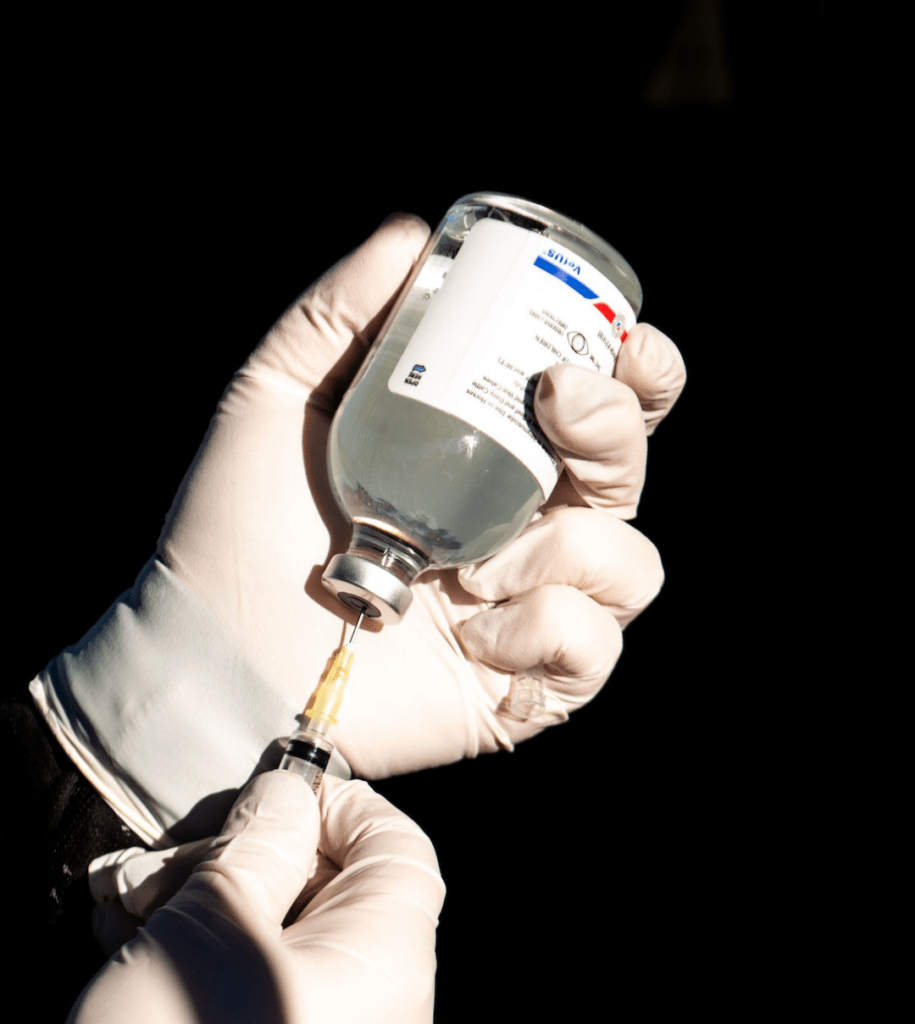
- What joint injections are, what they actually do, and how they’re used
- Why different types of injections are used, how they differ, the science behind each, and the pros and cons of each type
- How vets determine if injections could benefit your horse
- What a pre-injection examination process looks like
- How injections are performed on joints
- What the risks and potential side effects of injections are
- When it’s the right age to start joint maintenance
- What types of horses typically need joint maintenance
- How to choose the best joint maintenance strategy for your horse.
- Common myths and misconceptions about joint maintenance
Learn more and gain access to the full masterclass by clicking here!
In the past, when a horse’s gait has felt off or lacking in its usual impulsion, it was often assumed to be an issue of lameness. Now however, thanks to the improved diagnostics readily available at the Palm Beach Equine Clinic veterinarians are able to more accurately pinpoint the problem area. Perhaps surprisingly, it’s not always in the legs or hooves. With increasing frequency, the horse’s neck is being diagnosed as the root of the issue.
The Anatomy of the Equine Neck and What Can Go Wrong
In order to understand the problems that can arise in association with the horse’s neck, it’s important to first understand the anatomy.
The neck is composed of seven cervical vertebrae running from the head to the thorax, named C1 through C7, and each articulating with each other. The primary purposes of the neck are to move the head and to protect and transport the spinal cord and nerves, which run through the middle of the vertebrae.
Such a major role as the protection of the nerves and spinal cord can also come with some major risks and complications, with clinical signs of these problems generally presenting themselves either neurologically, as neck pain, or as lameness in the front legs. These more specific symptoms may include:
- Ataxia or clumsiness – Ataxia is defined as the “lack of control of bodily movements”. In the case of an ataxic horse, you may begin to notice staggering, sudden loss of balance, or even an inability to remain upright. Ataxia is generally an indicator of a neurological condition or damage to the spinal cord itself, caused by either developmental issues, trauma, or an infectious disease such as equine protozoal myeloencephalitis (EPM). Such neurological cases can often be the most debilitating.
- Lameness – You can think of the spinal cord and the nerves in the neck like an interstate, with the spinal cord itself acting as the major highway. As you are “driving” along the interstate, every so often there are little exits, which is where the other nerves come out. Should there be any impingement on the interstate or spinal cord itself, you’re likely looking at more severe complications – much like an accident on the highway. Should there be impingement on the nerves coming off of the spinal cord, it will more likely present itself like an accident a little way off an exit – not affecting the interstate itself, but possibly causing problems that spread elsewhere. That is where we see lameness issues arise.
This can be more difficult to pin down, but can often be due to pressure on the smaller nerves that pass through the openings in the vertebrae and supply the front legs. Arthritis of the articular facet joints of the vertebrae is another common reason for lameness, as anytime these joints become arthritic or inflamed, it can easily translate to the forelimbs.
- Neck Pain – This will often go hand-in-hand with lameness, as factors such as arthritis of the articular facet joints can lead to both symptoms. Other possible reasons for neck pain include trauma or inflammatory diseases.
Diagnosing the Problem
Neck problems, particularly those related to lameness, are generally diagnosed through a process of exclusion, first performing nerve blocks to or ruling out lower regions of the horse’s body. Palpation of the neck, testing of the neck’s movement, and full neurological exams may also be performed in addition to a full lameness exam, depending on the horse’s symptoms.
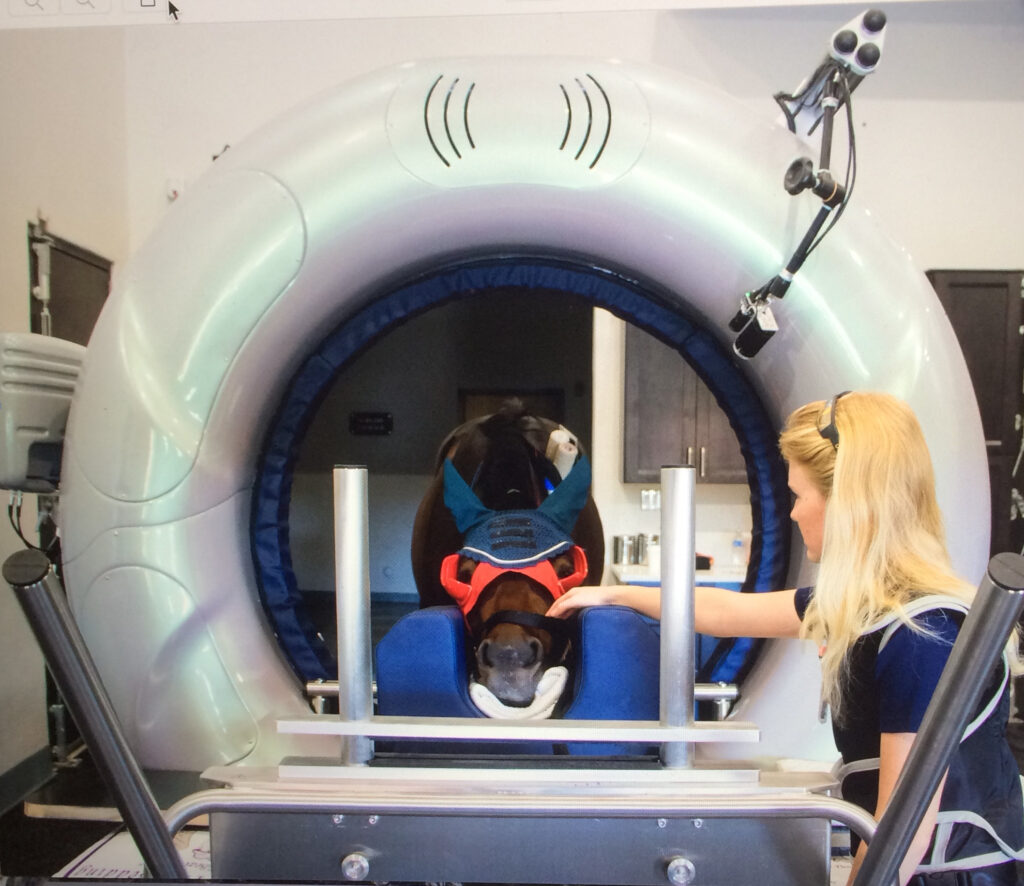
Once other regions of the horse are ruled out as the location of the problem, veterinarians are now able to use diagnostic images such as radiographs, nuclear scintigraphy and standing CT scans to specifically locate problems in the neck like never before.
In years past, those diagnostic resources were left for last-ditch cases when veterinarians really could not pinpoint any other problems. Today, with the advent of more modern technology, better radiographs, better ultrasound machines, and the more advanced imaging of nuclear scintigraphy and CT scans, veterinarians are able to readily utilize advanced diagnostics to save time and money, and to find the root of the problem more quickly and accurately.
The neck is one of the areas that has most clearly benefited from the progression in advanced imaging. While neck problems have likely been prevalent for some time, veterinarians are now finding those diagnoses more common, as they are able to more accurately locate the issue – particularly at clinics like Palm Beach Equine Clinic. Often these issues will go undiscovered or undiagnosed in the field, but they can be identified at Palm Beach Equine Clinic thanks to the readily available imaging tools.
As an example, if arthritic factors are suspected, nuclear scintigraphy can be used to look for areas of increased bone turnover. On the resulting bone scan, veterinarians are looking for areas where there is an increased calcium uptake because the bone is actively remodeling. These areas will appear darker on the scan and are generally a good indicator of a boney injury or arthritis, with the darker “hot spots” often appearing above the articular facet joints.
Also new and groundbreaking for the diagnosis of equine neck problems is the use of a Computerized Tomography or CT scan, with the ability to scan a standing horse with light sedation on the near horizon which will be available at the clinic this upcoming winter season.
Treatment
Once a solid diagnosis is arrived upon, the proper treatment protocols can be prescribed. Depending on the root of the problem, possible treatments may include shockwave therapy, regenerative therapies such as interleukin-1 receptor antagonist protein (IRAP) therapy or platelet-rich plasma (PRP) therapy, or one of the most common treatments, injections of the facet joints.
In the case of facet joint injections, veterinarians at Palm Beach Equine Clinic are able to medicate under ultrasound guidance, guiding a needle into the joints and delivering corticosteroids or similar medication. Surgery is also an option as a final approach to severe complications.
In milder cases, treatments may also just call for increased time off, chiropractic treatments, or the administration of non-steroidal anti-inflammatory (NSAID) medications.
If you suspect any issues with your horse’s neck, contact Palm Beach Equine Clinic any time by calling (561) 793-1599 to schedule an appointment.
This fall, the United States Equestrian Federation (USEF) unveiled its latest health rule requiring all horses entering a Federation-licensed competition be accompanied by documentation of Equine Influenza Virus (flu) and Equine Herpes Virus (rhinopneumonitis) vaccinations within six months of being stabled at the show. Now approaching a month of enforcement during the 2016 winter show season, the new vaccination requirements enacted by the USEF gave structure to requirements that were previously being developed and enforced on a show-by-show basis.
After Florida’s Equine Herpes (EHV) scare in February of 2013, horse show facilities began adopting vaccination requirements of their own, usually requiring EHV-1 and EHV-4 vaccines within 90 to 120 days of a horse’s arrival to the grounds.
Now, USEF specifically requires all licensed competitions comply with the same set of requirements while not increasing the workload for competition management. The six-month timeline also matches the operating procedures of international shows overseen by the FEI as well.
According to Palm Beach Equine Clinic’s own Dr. Richard Wheeler, the rule change simply makes sense.
“Most people regularly vaccinate their horses every six months anyway, so this rule should not present a disruption to current practices,” he said. “After the 2013 scare, competitions recognized the potential of closure due to infectious disease and started creating requirements which became inconsistent between shows.”
Whether directly or indirectly affected by rule change itself, an increase in awareness regarding equine infectious disease in recent years had minimized outbreaks, according to Dr. Wheeler.
“A good job is being done so far to keep a big problem away,” he added.
While efforts by the USEF, veterinarians, and horse owners alike have proved successful in keeping horses safe and healthy, Dr. Wheeler was quick to remind the equine community to not get complacent. He stresses the continuation of education and awareness.
“An increase in bio-security is the most significant benefit we’ve had as a result of these requirements,” he said. “This is the most protective measure that we have taken on as a community, and people are now cognizant of how disruptive bringing a sick horse to a show can be. We see people getting vets involved quickly and shows doing a good job of providing isolation. What’s been done in the past few years is a positive thing, but it’s important that we don’t let our guard down because we haven’t had an outbreak in a few years.”
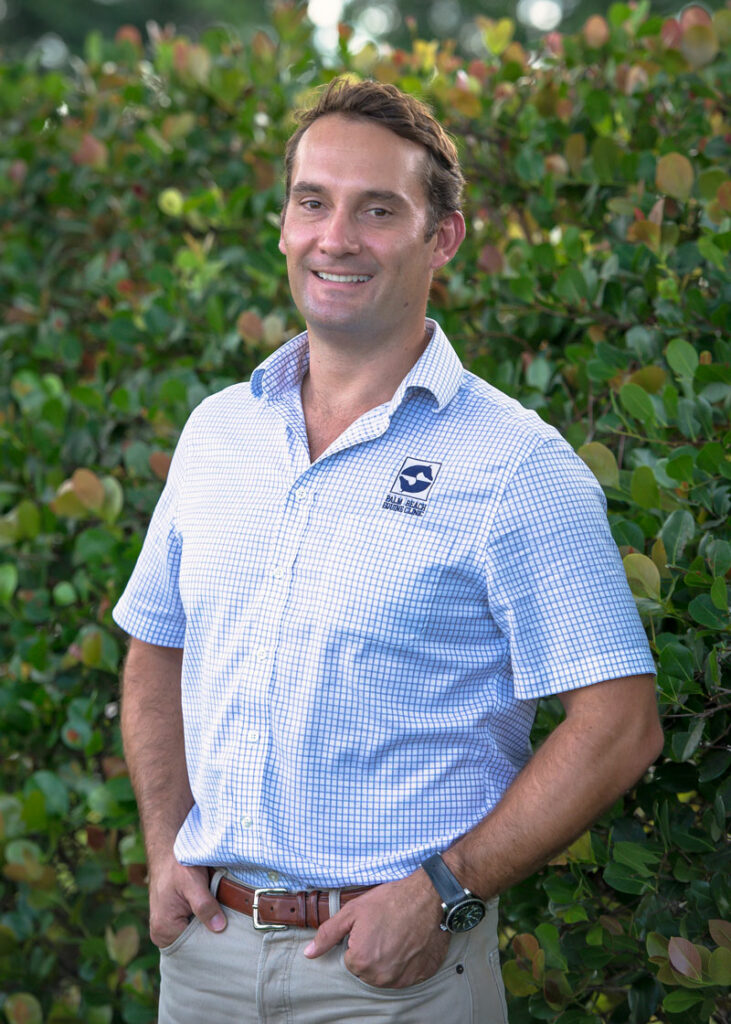

In addition to abiding by the USEF’s six-month rule, Dr. Wheeler also suggests the individuals responsible for caring for horses continue their efforts past the gates of the facility.
“Horse shows are often condensed places and limiting the exposure of horses is difficult,” he said. “It’s important that we stay really aware, take temperatures regularly, identify sick horses, and isolate them immediately. It’s all key to prevent outbreaks.”
Thanks to regulations, always improving technology, educated veterinarians, and diligent horsemen and women, the equine community is becoming more guarded against infectious disease than ever before.
To read more about the USEF vaccination requirement, click here. The experts at Palm Beach Equine Clinic stand ready to answer any questions horse owners may have about vaccinations and the requirements needed for equestrian competitions.
Palm Beach Equine Clinic’s Dr. Richard Wheeler recently shared the basic steps he takes in performing an equine pre-purchase exam.
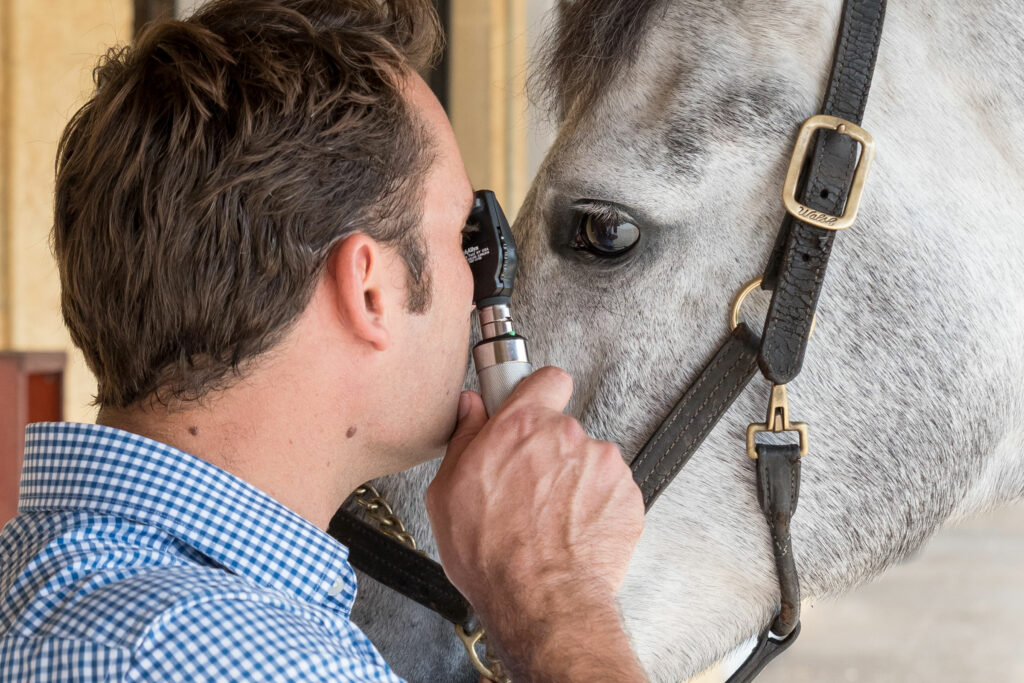
Dr. Wheeler and PBEC’s 28 veterinarians, including Board Certified surgeons, a internal medicine specialist and a radiologist, are considered some of the most experienced in treating equine athletes from all disciplines. Palm Beach Equine Clinic veterinarians enjoy the opportunity of working with top horses and riders at their home base in Wellington, FL, and through satellite services at competitions around the world.
With thousands of horses competing in Wellington at events such as the Winter Equestrian Festival and the Adequan® Global Dressage Festival, equine sales are a huge factor of equestrian businesses. Palm Beach Equine Clinic’s pre-purchase examination services are always available to assist in making the best decision on your next equine purchase.
No matter what the breed or discipline, pre-purchase exams include several basic initial steps. First, an overall health evaluation of the horse is completed, including previous health history, general condition, and conformation. The veterinarian examines specific body systems including the eyes, cardiovascular system and respiratory system.
Next, a lameness assessment is completed, including flexion tests, soft tissue structure palpation, and movement evaluation. Additional diagnostic imaging such as radiographs (x-rays), ultrasound, endoscopy, magnetic resonance imaging (MRI), or nuclear scintigraphy (bone scans) may be requested for additional information.
The goal of a pre-purchase exam is to assess its current state of the horse’s health and soundness at that time of the examination. Pre-purchase exams allow veterinarians to gather information that may help the owner and veterinarian predict a level of risk for the future use of the horse.
Steps Taken in a Pre-Purchase Exam
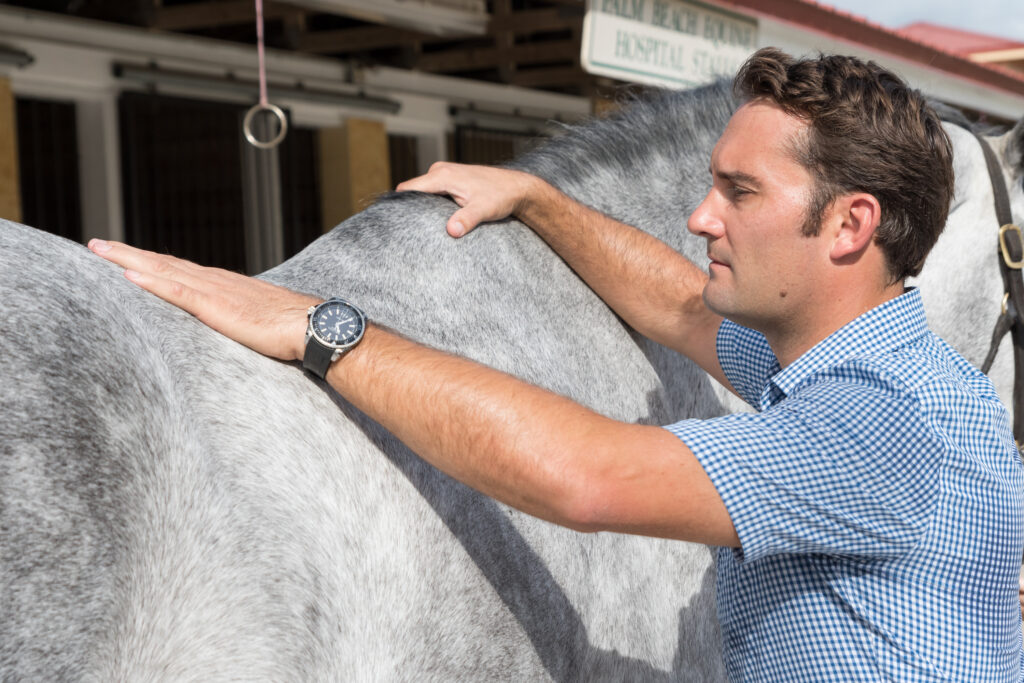
- “The first thing I do is talk to the potential buyer and trainer to gather their expectations and any concerns that have arisen during the trial of the horse. Next I discuss the horse with the current owner and/or trainer to determine what level of training or competition it is in, and if it has any previous issues that they are dealing with.”
- “Then we look at the horse in a static exam in the stall. We do a physical exam, looking at the whole body from front to back. Key points are the eyes, heart, and lungs and we palpate from the head and neck, to the back, and down the limbs. We are looking for signs of old injuries or areas that may have issues; conformation comes into play here as well.”
- “We want to look at the horse in a dynamic exam. We usually look at it on the lead line and on a lunge line, or trotting in a circle on hard and soft surfaces, and then also under saddle as well. I like to see all of my horses go under saddle because we can observe the interaction of horse and rider, which is very important. During this stage we will perform flexion tests and ask the horse to perform specific movements depending on the discipline.”
- Blood tests are often taken and normally will include CBC, Chemistry, Coggins test and a drug screen. Depending of the age or type of horse other tests may be performed.
- “Finally, there are some auxiliary tests, which may include radiographs, ultrasound exams, and endoscopy of the upper airways. These days, if there are certain issues, we will also include further diagnostic tests such as MRIs or bone scans. That depends on what is found in other parts of the exam. If there is something suspicious on a radiograph, the buyer might want to do more advanced imaging. Or sometimes, depending on the value of the horse, they might want to do that anyway.”
A Comprehensive Profile of the Horse
Dr. Wheeler pointed out that it is not the intention of a pre-purchase exam to recommend the horse for purchase or for sale. The exam is performed to provide information about the level of risk and educate the client of that risk. The client will make the decision on whether they want to buy the horse or not based on the information the veterinarian has provided as well as information from their trainer.
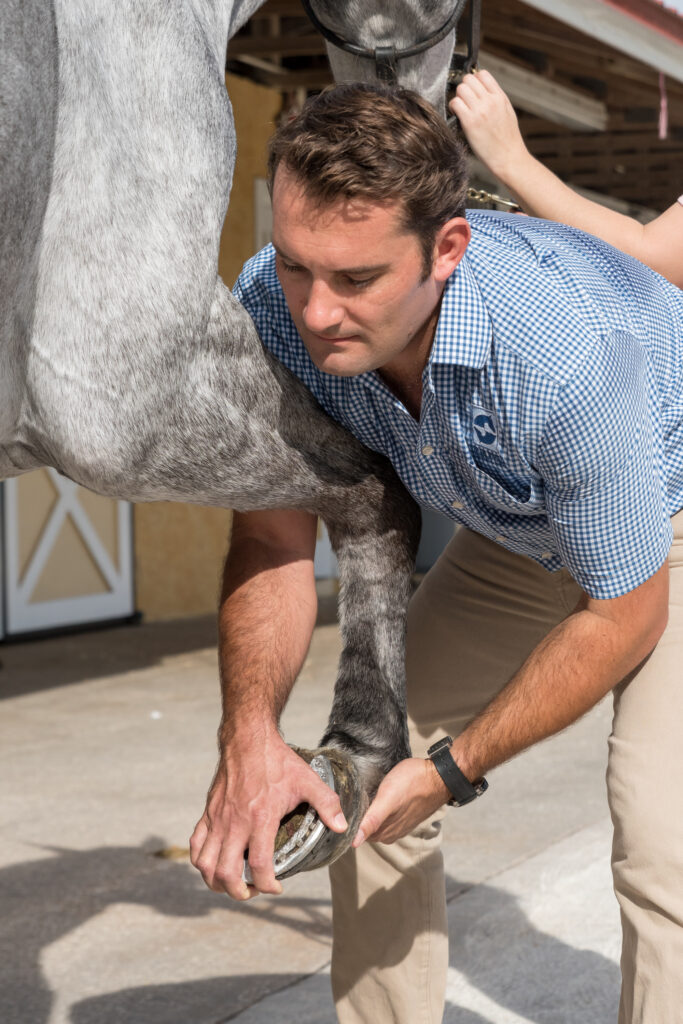
“What might be acceptable for you may not be for me, or vice versa, depending on what I want the horse for or the value of the horse,” Dr. Wheeler noted.
“It is not a pass/fail situation. We are just describing the horse, doing our best to state whether the issues that it has can be maintained or can be useful for the horse’s given profession, and what is expected of it, and this is where experience is so important. If the horse is being purchased as a low level children’s show horse, the stresses on it are going to be less than if it is being asked to go to the Olympics.”
Every exam is different, but the basic steps of evaluating a horse for any discipline or level of competition are fairly standard. It is important to have a veterinarian who is experienced and knowledgeable with the specific discipline to provide accurate guidance on the horse’s condition for the expected job. For the clientele of Palm Beach Equine Clinic, the veterinarians are all well-schooled in the different disciplines, and many have additional expertise in specific areas.
The world-renowned veterinarians of PBEC will be sharing their expertise on equine pre-purchase exams in a four-part series featured exclusively on ProEquest from February through April 2016. Located in the heart of Wellington, FL, Palm Beach Equine Clinic serves multi-discipline clientele at equestrian competitions throughout North America and abroad. To schedule a pre-purchase exam with one of Palm Beach Equine Clinic’s top veterinarians call 561-793-1599.
About Dr. Richard Wheeler

Dr. Wheeler graduated from the Royal Veterinary College in London in 2002. He spent his first two years of practice as an intern at Greenwood, Ellis and Partners in Newmarket, England, where he worked in a referral center specializing in the treatment of Thoroughbred racehorses and Sport Horses. Dr. Wheeler moved to Palm Beach Equine Clinic in 2005 and became a partner in 2009. Dr. Wheeler’s clients include Jumpers, Dressage and Polo and he is licensed to practice in FL, KY, NC and NY and also the UK and Europe.
As you prepare to compete, the partnership with your veterinary team is critical for your sport horse’s health and success. It is comforting to know that the finest equine hospital and sport horse care in the Southeast is less than one mile away from the Palm Beach International Equestrian Center and across the street from the Global Dressage Festival. The veterinarians and staff of Palm Beach Equine Clinic are respected throughout the industry for their advanced level of care and steadfast commitment to the equine industry and horse care.
Palm Beach Equine Clinic is proudly the Official Veterinarian of the Winter Equestrian Festival and the Global Dressage Festival, two of the world’s most competitive equestrian horse show circuits.
The team is onsite at all the competitions to provide veterinary services and is ready to step up in case of an emergency. This dedication has become invaluable over the years to many competitors that have needed their expertise in veterinary medicine.
As the consistent leader in sport horse medicine, Palm Beach Equine Clinic provides 24-hour coverage at their all-inclusive on-site hospital; complete with full surgical and internal medicine capabilities, laboratory, pharmacy and advanced diagnostic imaging center.
State-of-the-art diagnostic imaging services include:
- Standing magnetic resonance imaging (MRI)
- Nuclear Scintigraphy (bone scan)
- Digital ultrasonography and radiography
- Standing computed tomography (CT)
Furthermore, Palm Beach Equine Clinic performs thorough lameness examinations, extensive pre-purchase/pre-lease evaluations, dentistry, podiatry consultation, and complete reproductive services. Palm Beach Equine Clinic also provides alternative medicine services such as chiropractic and acupuncture therapies, as well as, resourceful preventative medicine programs.

The veterinarians of Palm Beach Equine Clinic are are top-level academics frequently published in popular equine magazines and national veterinary journals. One of the more recent members to the Board of Directors at the Palm Beach Equine Clinic is Dr. Richard Wheeler, whose primary area of interest is equine lameness and sports medicine. He is passionate about his role in maintaining sport horses to enjoy a long and successful career.
What are the latest innovations that allow you to administer cutting-edge care to sport horses?
Dr. Richard Wheeler: There are many exciting new developments in equine sports medicine. The addition of imaging modalities such as magnetic resonance imaging (MRI) and computed tomography (CT) together with recent improvements in digital radiography, ultrasound and Nuclear Scintigraphy allow us to be more specific with our diagnoses and image areas of the horse that we were previously unable to image. Furthermore, regenerative therapies such as platelet rich plasma (PRP), bone marrow concentrate and the use of stem cells offer exciting opportunities with regard to the treatment of a wide variety of conditions, including soft tissue and joint injuries.
What do you find separates the most successful equine competitor from the rest?
Dr. Richard Wheeler: Across the field of disciplines, I believe attention to detail and a good team are the most important factors. As a veterinarian, I try to work closely with the owner, rider, trainer, farrier, groom and often many other support staff members. I will often examine the high level horses every week during the intense winter season and we will work together to make subtle adjustments to keep the horse performing at their very best.
How do you feel about your move to the USA and Palm Beach Equine Clinic ten years ago?

Dr. Richard Wheeler: Time has gone fast! There is nowhere in the world like Wellington, Florida, it is a wonderful place to live and practice veterinary medicine. Palm Beach Equine Clinic is an amazing family with a wealth of experience and knowledge to draw on. I think our greatest strength is our team approach; we will spend hours discussing and debating the best approach to cases and I think this is incredibly valuable to our clients. It is of great value to me as a veterinarian to have the high quality equipment we have invested in as well as the support of our Board Certified Surgeons (Drs. Brusie, Gomez and Davis) and our Board Certified Radiologist Dr. Puchalski. I am a strong believer in developing a specialty as a veterinarian so having the depth of support at Palm Beach Equine Clinic allows me to concentrate on lameness and sports medicine with the capability to provide my clients with doctors who specialize in other areas such as alternative therapies, reproduction and dentistry.
Dr. Wheeler’s extensive experience with a variety of equine performance sports advanced after graduating from the Royal Veterinary College in London in 2002. Dr. Wheeler completed an internship at the world-renowned Newmarket Equine Hospital, specializing in surgery and sports medicine, before moving to Palm Beach Equine Clinic in 2005. Licensed to practice in Florida, Kentucky and New York, as well as the United Kingdom and Europe, Dr. Wheeler is an FEI official veterinarian. A horseman himself, Dr. Wheeler has competed in a variety of equine sports including eventing, dressage, show jumping and polo.
Many international Grand Prix riders, such as one of the United States’ top Dressage riders, Tuny Page, attributes the health and soundness of her horses to Dr. Wheeler and the Palm Beach Equine Clinic team.

“Richard is a fine veterinarian with great depth of experience and super instincts. On top of that, he communicates beautifully with me as the client and my grooms as my horse’s managers. Richard is very secure in his positions about diagnosis and treatment of the horses, which allows him the ability to communicate openly with other veterinarians and therapists. This works particularly well when I am traveling with the horses and need to have open communication between other veterinarians and Richard. Richard has always treated my staff with the respect and integrity they deserve and the result is tremendous trust within our team. The most important recommendation for Dr. Wheeler is, quite simply, that my horses are happy, healthy and sound.”
International Grand Prix Dressage Rider Tuny Page
Additionally, International Dressage star, Mikala Munter (DEN), who recently won the FEI Grand Prix Freestyle CDI 4*, knows the importance of equine health and states praise for Dr. Wheeler.
“Dr. Wheeler from Palm Beach Equine Clinic has a good eye and feel for what a horse needs, and he is the best veterinarian for a sport horse”
International Grand Prix Dressage Rider Mikala Munter
Palm Beach Equine Clinic is committed to provide care for your equine athlete throughout the year and across the globe, and support at shows across the USA, Europe and South America.
